Subject matter broken down by section
The aim of Meyyaram is to prepare the reader to lead a moral life. The word "Meyyaram" is composed of two elements: "Mey" and "Aram". "Mey" means the truth and "Aram" means virtue. In this work, Chidambaram explains these concepts in short, simple, and easily understood verses. The book has 125 chapters, divided into 5 parts. Each chapter contains 10 verses, that is, 10 lines. Each verse gives a piece of advice.
The first part of the book has 30 chapters, and is intended for students. In this part, Chidambaram says that childhood is the appropriate age for learning. The child should learn what he needs to learn, and should avoid other things. He should give importance to his duty, obedience, education and good health.
Here, Chidambaram writes about the body, mind and soul. He explains that the mind is responsible for our activities, so the mind should control the body, while the soul should guide the mind. It also explains that one's life is self-determined, while God is only an observer. In other words, whether one's life has a good or bad outcome is determined by whether one's actions were good or bad. Rather than believing fate to be predetermined, actions play a prominent role in determining one's future.
Chidambaram urges students to avoid vices, such as: meat, alcohol, theft, slander, lying, alms, jealousy, evil friendship, and gossip. He teaches students to give importance to virtues such as good friendship, gratitude, equity, modesty, morality, assiduity, perseverance.
The second part contains 30 chapters, of which twenty have been translated. This part speaks about family life. It advises us on how to select a spouse, how to lead family, etc. It helps us overcome ignorance, folly, procrastination, forgetfulness, sluggishness, etc. It instructs us to avoid too much sleep, pride, dread, covetousness, etc.
The third part has 50 chapters, in which Chidambaram explains how to govern a country.
The fourth part contains 10 chapters and speaks about Truth.
The fifth and final part consists of only 5 chapters. It explains the way to reach the state of Godliness.
Revolutionary ideas of Chidambaram in Meyyaram
Meyyaram contains some notions that were revolutionary for its time. Many of these notions pertained to women's rights. Chidambaram writes in the second line of this book, "Men and women have the right to study" (although women were not allowed to go to school when this was written). Elsewhere in the book, Chidambaram promotes the equal treatment of men and women. In the 7th chapter, he explains the qualities of a good teacher, and declares that both men and women have the right to become a teacher.
In the 34th chapter, he writes in the first line, "The wise among the couple can govern the family," and in the second line, "It is vain talk to say that the male is superior". Chidambaram makes it clear that a woman can be wiser than a man. He also says that the husband and the wife should consult each other before executing anything.
Another culturally revolutionary idea concerns the practice of remarrying, which was culturally unacceptable. In the 33rd chapter, Chidambaram writes that it is dignified to marry a person who has lost a spouse.

Dharma is a key concept with multiple meanings in Indian religions, such as Hinduism, Buddhism, Jainism, Sikhism and others. Although there is no direct single-word translation for dharma in European languages, it is commonly translated as "righteousness", "merit" or "religious and moral duties" governing individual conduct.

Patience is the ability to endure difficult circumstances. Patience may involve perseverance in the face of delay; tolerance of provocation without responding in disrespect/anger; or forbearance when under strain, especially when faced with longer-term difficulties, or being able to wait for a long amount of time without getting irritated or bored. Patience is the level of endurance one can have before disrespect. It is also used to refer to the character trait of being steadfast. Antonyms include hastiness and impetuousness.

Virtue is moral excellence. A virtue is a trait or quality that is deemed to be morally good and thus is valued as a foundation of principle and good moral being. In other words, it is a behavior that shows high moral standards: doing what is right and avoiding what is wrong. The opposite of virtue is vice. Other examples of this notion include the concept of merit in Asian traditions as well as De.

Temperance in its modern use is defined as moderation or voluntary self-restraint. It is typically described in terms of what an individual voluntarily refrains from doing. This includes restraint from revenge by practicing non-violence and forgiveness, restraint from arrogance by practicing humility and modesty, restraint from excesses such as extravagant luxury or splurging, and restraint from rage or craving by practicing calmness and self-control.

Thiruvalluvar, commonly known as Valluvar, was a celebrated Tamil poet and philosopher. He is best known as the author of the Tirukkuṟaḷ, a collection of couplets on ethics, political and economical matters, and love. The text is considered an exceptional and widely cherished work of Tamil literature.
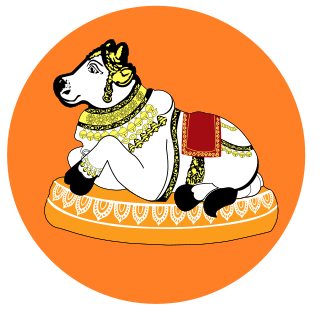
The Tirumantiram or Thirumantiram is a Tamil poetic work, written either in the 6th century CE or post 10th century CE by Tirumular and is the tenth of the twelve volumes of the Tirumurai, the key texts of Saiva Siddhanta and the first known Tamil work to use the term. Tirumantiram's literal meaning is “Sacred mantra” or "Holy incantation". The Tirumantiram is the earliest known exposition of the Shaiva Agamas in Tamil. It consists of over three thousand verses dealing with various aspects of spirituality, ethics and praise of Siva. But it is more spiritual than religious and one can see the difference between Vedanta and Siddhanta from Tirumular's interpretation of the Mahavakyas. According to historian Venkatraman, the work covers almost every feature of the siddhar of the Tamils. According to another historian, Madhavan, the work stresses on the fundamentals of Siddha medicine and its healing powers. It deals with a wide array of subjects including astronomy and physical culture.
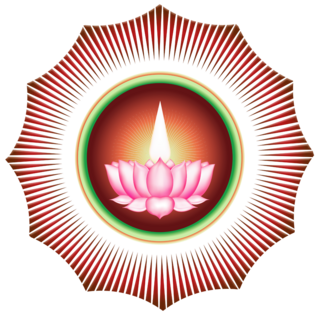
Akilathirattu Ammanai, also called Thiru Edu, is the main religious text of the Tamil belief system Ayyavazhi. The title is often abbreviated to Akilam or Akilathirattu.
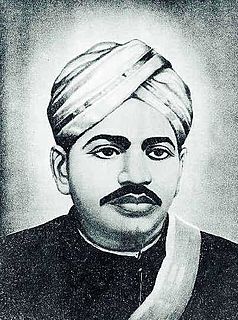
Valliyappan Olaganathan Chidambaram Pillai was born into a Royal Family of Tuticorin. He is popularly known by his initials, V.O.C. and is also known as Kappalottiya Tamizhan or "the Tamil Helmsman". He was a Tamil Indian freedom fighter and former leader of the Indian National Congress. Founder of Swadeshi Steam Navigation Company in 1906 to compete against the monopoly of the British India Steam Navigation Company (BISNC). He launched the first indigenous Indian shipping service between Tuticorin (India) and Colombo with the Swadeshi Steam Navigation Company (SSNC), competing against British ships. Tuticorin Port Trust, one of India's thirteen major ports, is named after him. At one time a member of the Indian National Congress, he was later charged with sedition by the British government and sentenced to life imprisonment, and his barrister license was revoked.

Arunagirinaadhar was a Tamil Hindu saint-poet who lived during the 15th century in Tamil Nadu, India. In his treatise A History of Indian Literature (1974), Czech Indologist Kamil Zvelebil places Arunagirinathar's period between circa 1370 CE and circa 1450 CE. He was the creator of Thiruppugazh, a book of poems in Tamil in praise of lord Murugan.

Thiruvarutprakasa Vallalār Chidambaram Ramalingam, commonly known in India and across the world as Vallalār, Ramalinga Swamigal and Ramalinga Adigal, was one of the most famous Tamil Saints and also one of the greatest Tamil poets of the 19th century and belongs to a line of Tamil saints known as "gnana siddhars".
Parimelalhagar, sometimes spelled Parimelazhagar, born Vanduvarai Perumal, was a Tamil poet and scholar known for his commentary on the Thirukkural. He was the last among the canon of ten medieval commentators of the Kural text most highly esteemed by scholars. He was also among the five oldest commentators whose commentaries had been preserved and made available to the Modern era, the others being Manakkudavar, Pari Perumal, Kaalingar, and Paridhi. Of all the ancient commentaries available of the Kural literature, Parimelalhagar's commentary is considered by scholars as the best both in textual and in literary aspects. The codification of the writings of Valluvar is attributed to Parimelalhagar. Parimelalhagar also remains the most reviewed, in terms of both praise and criticism, of all the medieval Kural commentators. Praised for its literary richness and clarity, Parimelalhagar's commentary is considered highly complex and exquisite in its own right that it has several scholarly commentaries appearing over the centuries to elucidate it. Along with the Kural text, Parimelalhagar's commentary has been widely published that it is in itself regarded a Tamil classic.
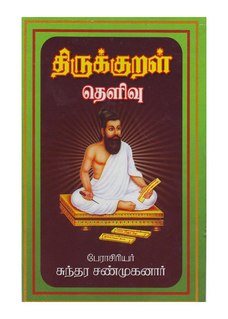
The Tirukkuṟaḷ, or shortly theKural, is a classic Tamil language text consisting of 1,330 short couplets, or kurals, of seven words each. The text is divided into three books with aphoristic teachings on virtue (aram), wealth (porul) and love (inbam), respectively. Considered one of the greatest works ever written on ethics and morality, it is known for its universality and secular nature. Its authorship is traditionally attributed to Valluvar, also known in full as Thiruvalluvar. The text has been dated variously from 300 BCE to 5th century CE. The traditional accounts describe it as the last work of the third Sangam, but linguistic analysis suggests a later date of 450 to 500 CE and that it was composed after the Sangam period.
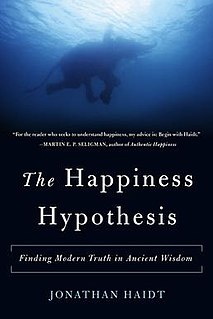
The Happiness Hypothesis: Finding Modern Truth in Ancient Wisdom is a 2006 psychology book written by Jonathan Haidt for a general audience. In it, Haidt poses several "Great Ideas" on happiness espoused by thinkers of the past—Plato, Buddha, Jesus, and others—and examines them in the light of contemporary psychological research, extracting from them any lessons that still apply to our modern lives. Central to the book are the concepts of virtue, happiness, fulfillment, and meaning.
Tiruppathur, also spelt Thiruppathur / Thirupputhur, is a Taluk, Town Panchayat in Sivaganga district in the India state of Tamil Nadu. Tiruppathur is situated at Sivaganga district, 27 km from Sivaganga 22 km away from Karaikudi. The place is famous for Thiruthalinathar Temple, a Padal petra sthaalam, which is the sixth of the fourteen such in the Pandyan region.
Manakkudavar was a Tamil scholar and commentator known for his commentary on the Tirukkural. His is the earliest of the available commentaries on the Kural text, and hence considered to bear closest semblance with the original work by Valluvar. He was among the canon of Ten Medieval Commentators of the Kural text most highly esteemed by scholars. He was among the five ancient commentators whose commentaries had been preserved and made available to the Modern era, the others being Pari Perumal, Kaalingar, Paridhi, and Parimelalhagar.
Kaalingar, also known as Kalingarayar, was a Tamil scholar and commentator known for his commentary on the Thirukkural. He was among the canon of Ten Medieval Commentators of the Kural text highly esteemed by scholars. He was also among the five ancient commentators whose commentaries had been preserved and made available to the Modern era, the others being Manakkudavar, Pari Perumal, Paridhi, and Parimelalhagar.
The Ten Medieval Commentators were a canonical group of Tamil scholars whose commentaries on the ancient Indian didactic work of the Kural are esteemed by later scholars as worthy of critical analysis. These scholars lived in the Medieval era between the 10th and 13th centuries CE. Among these medieval commentaries, the commentaries of Manakkudavar, Kaalingar, and Parimelalhagar are considered pioneer by modern scholars.
The Book ofAṟam, in full Aṟattuppāl, also known as the Book of Virtue, the First Book or Book One in translated versions, is the first of the three books or parts of the Kural literature, a didactic work authored by the ancient Indian philosopher Valluvar. Written in High Tamil distich form, it has 38 chapters each containing 10 kurals or couplets, making a total of 380 couplets, all dealing with the fundamental virtues of an individual. Aṟam, the Tamil term that loosely corresponds to the English term 'virtue', correlates with the first of the four ancient Indian values of dharma, artha, kama and moksha. The Book of Aṟam exclusively deals with virtues independent of the surroundings, including the vital principles of non-violence, moral vegetarianism, veracity, and righteousness.
Tirukkural, or the Kural, an ancient Indian treatise on common moralities, has been given by various names ever since its writing between the first century BCE and the 5th century CE. Originally referred to as Muppāl, perhaps as presented by its author Valluvar himself at the ruler's court, the work remains unique among ancient works in that it was not given any title by its author himself. All the names that the work is referred by today are given by later days' scholars over the millennia. The work is known by an estimated 44 names excluding variants, although some scholars list even more. E. S. Ariel, a French scholar of the 19th century who translated the work into French, famously said of the Kural thus: Ce livre sans nom, par un autre sans nom.
The Book of Inbam, in full Iṉbattuppāl, or in a more sanskritized term Kāmattuppāl, also known as the Book of Love, the Third Book or Book Three in translated versions, is the third of the three books or parts of the Kural literature, authored by the ancient Indian philosopher Valluvar. Written in High Tamil distich form, it has 25 chapters each containing 10 kurals or couplets, making a total of 250 couplets all dealing with human love. The term inbam or kamam, which means 'pleasure', correlates with the third of the four ancient Indian values of dharma, artha, kama and moksha. However, unlike Kamasutra, which deals with different methods of lovemaking, the Book of Inbam expounds the virtues and emotions involved in conjugal love between a man and a woman, or virtues of an individual within the walls of intimacy, keeping aṟam or dharma as the base.











